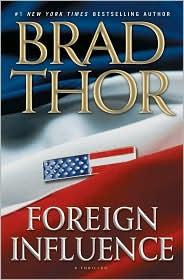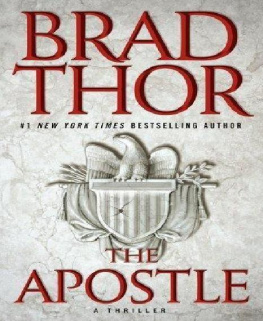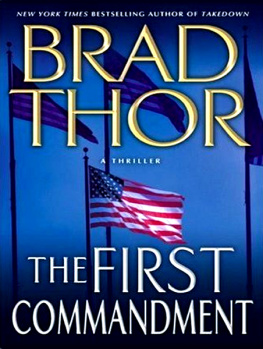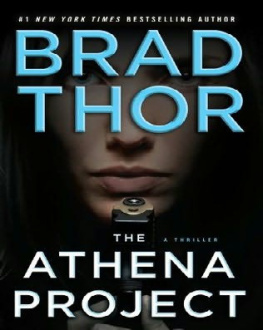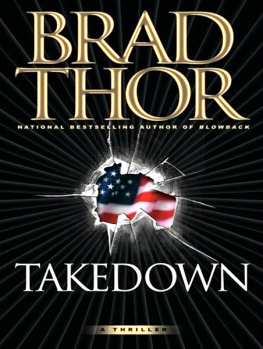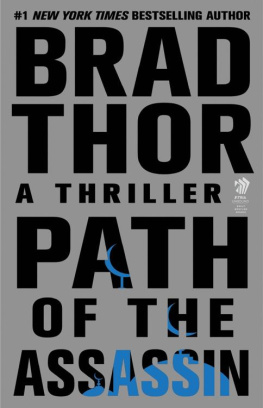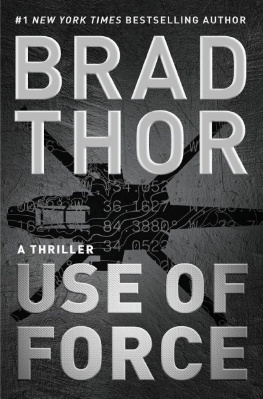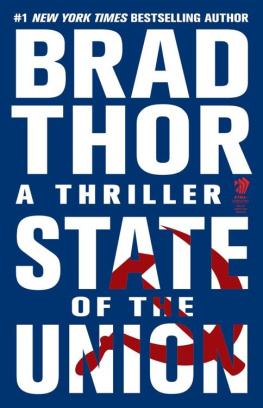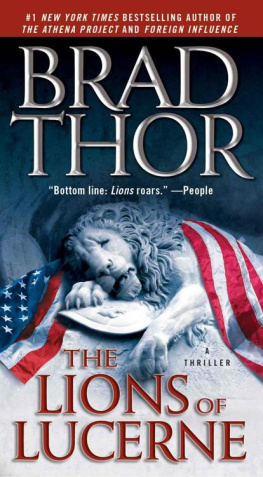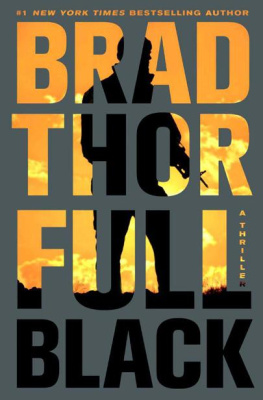
Brad Thor
State Of The Union
The third book in the Scot Harvath series
For Sloane-
Welcome to the world, little one
Cunctando Regitur Mundis
Waiting, one rules the world.
WASHINGTON, D.C.
TUESDAY EVENING, JANUARY 28TH
What I want, Chuck, is ten minutes of peace and quiet so I can think, snapped the president to his chief of staff.
Charles Anderson had never seen his boss like this. Then again, America had never faced a situation of this magnitude before. With less than three hours until he was expected to deliver his State of the Union address, President Jack Rutledge had already made the tough decision of evacuating Congress and settling on a videotaped address from the White House. The hardest call, though, still lay before him.
Okay, people, voiced Anderson. You heard the president. Lets give him the room. Everybody out. Well reconvene in the Situation Room.
Once the Oval Office had cleared out, the president leaned back in his chair, closed his eyes and massaged his forehead with the heels of his hands. His oath of office called for him to preserve, protect and defend the Constitution-a body of laws, which obliged him, to give to Congress information of the State of the Union and recommend to their consideration such measures as he shall judge necessary and expedient. Never in a million years could he have imagined that the execution of his duties would lead to the unraveling of everything America had fought to become.
He was reminded of the first State of the Union address given by George Washington over two hundred years ago at New York s Federal Hall. With the country in the fledgling stages of its great democratic experiment, Washington had focused on the very concept of union itself and the challenges not only of establishing, but of maintaining it.
How in the hell had things come to this?Rutledge wondered as he opened his eyes and studied the two folders on the desk in front of him. Each contained a different version of his State of the Union address, and each had the potential to be equally devastating. The fate of millions of Americans would be decided by what he said and did in the next three hours.
Though not a particularly religious man, President Jack Rutledge closed his eyes once again and this time prayed to God for guidance.
ZVENIGOROD, RUSSIA
THREE WEEKS PRIOR
Winter has come too early this year, Sergei Stavropol complained as he threw his long overcoat onto a chair near the door. He was the last of the four men to arrive. I think this will be one of the coldest we have seen in a long time. Crossing over to the bar, he withdrew a decanter of brandy and filled a delicate crystal snifter. He was an enormous man with dark hair and a large nose that bore evidence of having been broken many times. At six-foot-three inches tall and two hundred seventy-five pounds, he was bigger than any of the other men in the room, but it was his dark, penetrating eyes which drew all of the attention and which had long ago earned him his nickname. Though he hated theRasputin moniker, he found that it instilled in his enemies and those who would oppose him a certain degree of fear, and therefore he had allowed it to stick. His salt and pepper-colored hair was trimmed in a military-style crew cut. His skin was severely pockmarked and his left eye drooped slightly due to a grenade that had exploded in his face as he was pushing one of his men out of dangers way. While he was twice as brave as his assembled colleagues, he was easily less than half as refined, and as if to demonstrate that very fact, he downed his brandy in one long swallow.
The men around the table smiled at their friends behavior. Stavropol was as constant as the northern star. In over forty years, nothing had changed him-not money, not power, not even the knowledge that he would go down in history as one of the greatest soldiers Mother Russia had ever produced. In combat, he had saved the life of each man in the room, some more than once, but they had not gathered in this remote wooded area forty miles west of Moscow to relive the past. On the contrary, the four men seated around the worn oak table were there to shape the future.
Outside, a breath of icy wind blew across the gravel driveway of the centuries-old hunting lodge. From its stone chimney, tendrils of grey smoke could be seen only for an instant before being sucked upward into an ever-darkening sky. As the cold wind pressed itself against the formidable structure, it moaned deeply.
Stavropol, the groups leader, walked over to the fireplace and spent several moments prodding the glowing embers with an iron poker as he pretended to search for the appropriate words to say. It was an empty gesture. He knew exactly what he was going to say. Spontaneity was not one of his attributes. It led to mistakes and mistakes were the harbingers of failure. Stavropol had rehearsed this moment in his mind for years. His raw determination was equaled only by his capacity for cold, detached calculation.
After a sufficient show of introspection, he raised himself to his full height, turned to his colleagues and said, It pleases me to see you all here. We have waited many long years for this. Today we embark upon a new and glorious chapter in the history of not only our beloved Russia, but of the world. Fifteen years ago we-
Were much younger, interrupted one of the men.
It was Valentin Primovich, the plodder, the worrier. He had always been the weakest link. Stavropol fixed him with a steady look. He had anticipated the possibility of dissension in the ranks, but not straight away. Unconsciously, his hand tightened into a fist. He reminded himself to relax.Wait, he told himself.Just wait.
Stavropol attempted to soften the features of his face before responding. Valentin, we are still young men. And what we may have lost in years, we have more than gained in experience.
We have good lives now, said Uri Varensky, coming to the defense of Primovich. The world is a different place.Russia is a different place.
As we knew it would be, said Stavropol as his eyes turned on Varensky. He had grown soft and lazy. Had Stavropol been told fifteen years ago that the thick narcosis of complacency would one day overtake such a great man, such a great soldier, Stavropol never would have believed it. You forget that the change came because of us. It wasour idea.
It wasyour idea, replied Anatoly Karganov. We supported you, as we always have, but Uri and Valentin are correct. Times have changed.
Stavropol couldnt believe his ears.Was Karganov, one of the greatest military minds the country had ever seen, siding with Primovich and Varensky? The Anatoly Karganov?
Despite all of his careful planning, the meeting was not going the way Stavropol had envisioned. He stopped and took a deep breath, once again trying to calm himself, before responding. I have seen these changes. Driving here from Moscow I saw them up and down the roadsides-old women sweeping gutters with homemade brooms, or selling potatoes and firewood just to make enough to eat, while the new rich drive by in their BMW and Mercedes SUVs listening to American rap music.
In crumbling houses beyond the roadways, young Russian children smoke crack cocaine, shoot up with heroin, and spread tuberculosis and the AIDS virus, which are decimating our population. Where once we celebrated the deep pride we held in our country, now our posters and billboards only promote all-inclusive vacations to Greece, new health clubs, or the latest designer fashions from Italy.
But Russia has made gains, insisted Karganov.
Next page

